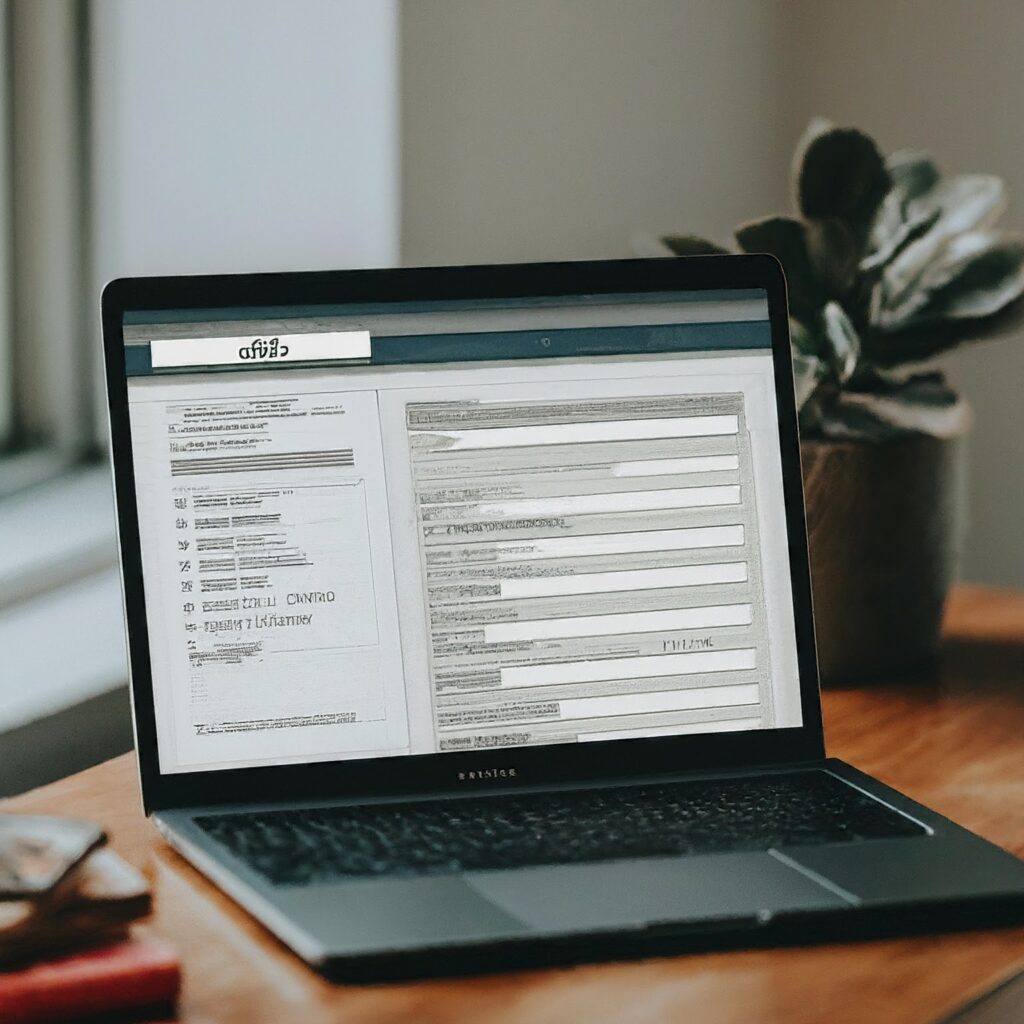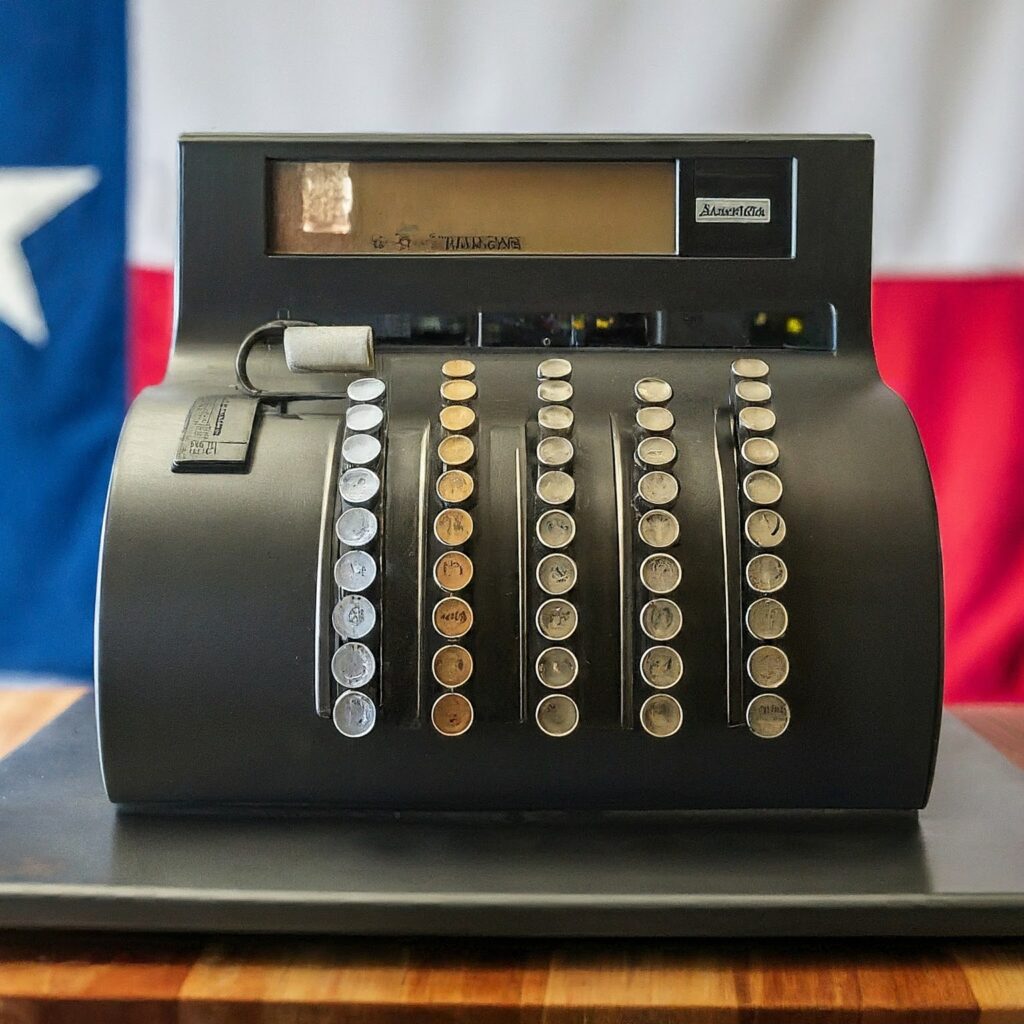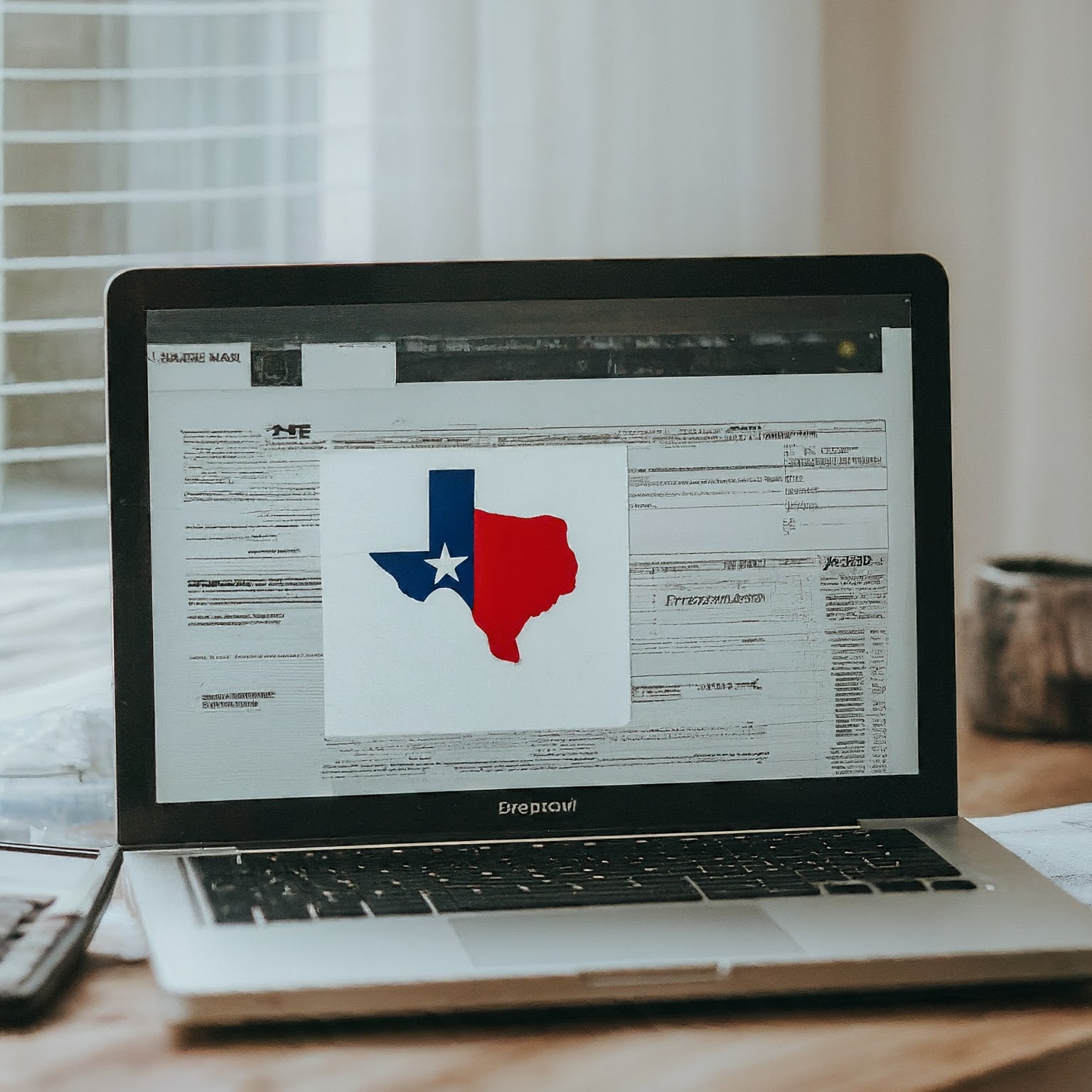Running an e-commerce business can be incredibly rewarding, but going through the complexities of sales tax compliance across different states can quickly become a headache. Texas, with its growing online marketplace, presents its own unique set of rules for e-commerce sellers. This comprehensive guide will equip you with the knowledge you need to stay compliant with Texas sales tax and use tax regulations.
Texas Sales Tax for Online Sellers: How to Register, Report, Calculate, Pay, File, and Discounts, Nexus, & Exemptions, All Explained
Texas operates under a destination-based sales tax system, meaning the sales tax rate applied to a transaction depends on the customer’s location, not the seller’s. The state levies a base sales tax rate of 6.25%, but local jurisdictions (cities, counties, and transit authorities) can add on an additional maximum of 2%, bringing the combined total sales tax rate to 8.25% at most.
Here’s a breakdown of the key components of Texas sales tax and use tax for e-commerce businesses:
- Sales Tax: This is a tax collected by sellers on the sale of taxable goods and certain services within Texas.
- Use Tax: This is a tax imposed on the use, storage, or consumption of taxable items purchased from out-of-state vendors with no sales tax collected at the time of purchase.
The crucial question for e-commerce businesses is: when are you obligated to collect sales tax in Texas?
We’ll delve deeper into this in the next section, exploring factors like nexus, product types, and specific situations to help you determine your sales tax collection responsibilities in the Lone Star State.
Collecting Sales Tax in Texas
Whether you need to collect sales tax in Texas hinges on a concept called the sales tax nexus. In simpler terms, a nexus is the economic connection that a seller has with a state, this connection is what triggers or determines if a seller is obligated to collect and remit sales tax for a particular location.

What triggers nexus in Texas
Here’s a breakdown of key factors that can establish or trigger nexus in Texas:
1. Physical Presence
If you have a warehouse, office, store, or any other physical location within Texas, can create a nexus for you.
2. Economic Activity
- Sales Threshold: Surpassing a certain dollar amount or number of transactions in sales to Texas customers can establish nexus. The exact thresholds are subject to change.
- Solicitation Activities: Actively soliciting sales in Texas through methods like attending trade shows, running targeted online advertising to Texas residents, or having a salesperson physically present in the state can establish nexus.
Here are some specific questions Texas online business owners commonly ask regarding sales tax collection:
Do I need to collect sales tax in Texas for out-of-state purchases
No, if you don’t have nexus in Texas (as explained above), you are not obligated to collect sales tax on sales to customers outside of Texas. However, the customer may be responsible for paying use tax directly to the state.
Does Etsy collect sales tax for Texas
Online marketplaces like Etsy generally have their own policies regarding sales tax collection. It’s essential to check Etsy’s specific guidelines for Texas sales tax. However, the ultimate responsibility for sales tax compliance rests with the seller, so it’s wise to understand your nexus and collection obligations in Texas regardless of any marketplace policies.
What do I need to collect sales tax in Texas
If you have nexus in Texas, you’ll need to register for a sales tax permit with the Texas Comptroller of Public Accounts. This will allow you to collect and remit sales tax on taxable sales within the state. We’ll cover the details of sales tax registration in the next section.
Does Texas require internet sales tax collection
Texas has no separate sales tax for online transactions. The general sales tax applies to all taxable goods and services sold within the state, regardless of the sales channel (online or brick-and-mortar).
Does texas charge sales tax on services
Generally, services are not subject to Texas sales tax due to the Internet Tax Freedom Act (ITFA) of 2016, effective July 1, 2020. However, the types of services listed here are subject to Texas sales tax: Amusement Services. Cable Television Services and Bundled Cable Services.
Texas does not impose sales tax on separately stated internet access charges due to the Internet Tax Freedom Act (ITFA) of 2016, effective July 1, 2020.
Can counties in Texas collect a sales tax
Yes, counties in Texas can collect sales tax. As mentioned earlier, local jurisdictions in Texas can add an additional maximum of 2% to the base sales tax rate of 6.25%, bringing the combined total sales tax rate to a maximum of 8.25%. You’ll need to determine the specific sales tax rate applicable to your customer’s location within Texas.
How to collect sales tax in Texas
Once you’ve registered for a sales tax permit and determined the appropriate sales tax rate for your customer’s location, you’ll need to collect the tax at the time of sale and remit it to the Texas Comptroller of Public Accounts. Many e-commerce platforms offer built-in sales tax calculation and collection features.
To calculate your sales tax after collecting it, choose a technology like AtomicTax that can help you automatically calculate it in no time and provide you with a detailed report that allows you to see a breakdown of the total orders, discounts, exemptions, sales tax collected, etc.
If used equipment is sold in Texas, is sales tax collected and how much
Generally, sales tax applies to the sale of most tangible personal property in Texas, including new and used equipment. However, there are certain exceptions, such as sales to qualified businesses for resale. We’ll explore sales tax exemptions in more detail in another section.
Does a nonprofit have to collect Texas sales tax
Most non-profit organizations are exempt from collecting sales tax in Texas for qualified sales.
Texas exemption from collecting sales tax
There are various exemptions from collecting sales tax in Texas, including certain services, specific items (like groceries), and sales to qualified non-profit organizations. We’ll cover sales tax exemptions in detail in a later section below.
Registering for a Sales Tax Permit in Texas
If you’ve established nexus in Texas through physical presence, economic activity, or solicitation activities as discussed earlier, you’ll need to register for a sales tax permit with the Texas Comptroller of Public Accounts. Here’s a breakdown of the registration process:

How to register for a sales tax permit in Texas (5 easy steps)
- Gather Required Information:
- Business Name and Legal Structure (Sole Proprietorship, LLC, Corporation, etc.)
- Federal Employer Identification Number (EIN)
- Business Address and Mailing Address
- Contact Information (Phone Number and Email)
- Social Security Number (for Sole Proprietorships) or Officer/Owner Information (for other structures)
- Choose Your Registration Method:
- Online: The Texas Comptroller offers a user-friendly online registration system accessible through their website. This is the quickest and most recommended method.
- Mail: You can download and complete the paper application form (AP-201) and mail it to the Texas Comptroller’s office.
- Complete the Registration Application:
- Whether online or offline, provide all the required information accurately and thoroughly.
- You may be prompted to answer questions to determine your potential need for a surety bond. A surety bond acts as a financial guarantee for your future sales tax payments.
- Submit Your Application:
- Once completed, submit your online application or mail the completed paper form.
- The processing time typically takes a few business days.
- Receive Your Sales Tax Permit:
- Upon approval, you’ll receive your sales tax permit electronically or through mail.
What are Texas sales tax registration requirements and how much does it cost
There are no fees associated with registering for a sales tax permit in Texas. However, as mentioned earlier, the application process may prompt you regarding a potential need for a surety bond. The requirement and amount of the bond depend on your projected sales tax liability.
Additional Resources:
- Texas Comptroller of Public Accounts Sales Tax Permit Application: https://comptroller.texas.gov/taxes/permit/
- AP-201 Texas Application for Texas Sales and Use Tax Permit
How long does it take to receive your Texas sales tax permit
According to the Texas Comptroller of Public accounts website, it takes 2-4 weeks to receive your permit once they have received your signed application.
How to check the status of your Texas sales tax permit
You can check your Texas sales tax permit either online or by contacting the Texas comptroller of public accounts. Below is the breakdown of how to follow each method.
1. Online: The Texas Comptroller of Public Accounts website offers a Sales Taxpayer Search tool. You can access this tool here: https://comptroller.texas.gov/
By entering your permit number, FEIN (Federal Employer Identification Number), legal business name, or other relevant details, you can retrieve information about your permit status, including whether it’s active or inactive.
2. Contact the Texas Comptroller of Public Accounts: You can call the Texas Comptroller’s helpline at (800) 252-1381 or contact them through their website for direct assistance with checking your permit status.
How many digits is a Texas sales tax permit number
A Texas Sales Tax Permit Number is 11 digits long.
Where can I find my 11-digit taxpayer number in Texas
Your Texas 11-digit taxpayer number is the same as your federal Employer Identification Number (EIN). If you haven’t obtained an EIN yet, you can apply for one for free on the IRS website: https://www.irs.gov/businesses/small-businesses-self-employed/apply-for-an-employer-identification-number-ein-online
How do I get a Texas sales and use tax permit number
Here’s the application process to follow to obtain a Texas sales and use tax permit number.
- Gather your business information, including your legal business name, address, and EIN.
- Visit the Texas Comptroller’s website and access the online sales tax permit application.
- Complete the application form electronically, providing the required business details.
- Submit the application. There’s typically no fee associated with obtaining a Texas Sales Tax Permit.
- Once approved, you’ll receive your permit number via email or mail.
Is EIN the same as a sales tax ID in Texas
Yes, your EIN (employer identification number) is the same as your Texas sales tax ID. Both numbers identify your business for tax purposes.
How do I reactivate my Texas sales tax permit
Here’s the application process to follow to reactivate your Texas sales and use tax permit
- Online: Submit a request to reactivate your permit through the Texas Comptroller’s website using your online account.
- Phone: Call the Texas Comptroller’s helpline at (800) 252-1381 to speak with a representative about reactivating your permit.
- Mail: In some cases, you may be required to mail a reactivation request form along with any outstanding tax payments or penalties to the Texas Comptroller’s office.
The reactivation process may involve fulfilling any outstanding tax obligations or penalties associated with your permit.
By registering for a sales tax permit, you’ll be authorized to collect and remit sales tax on taxable sales within Texas. This ensures you stay compliant with state regulations and avoid potential penalties for non-compliance.
We’ll cover the specifics of Texas sales tax rates, calculation, reporting, and filing in the following sections of this comprehensive guide.
Texas Sales Tax Rate
Understanding the different sales tax rates applicable in Texas is crucial for accurate sales tax collection. Here’s a breakdown of what you need to know:

What is the Texas sales tax rate
The state of Texas levies a base sales tax rate of 6.25%. This applies to most taxable goods and services sold within the state.
What are Texas county sales tax rate
It’s important to remember that Texas operates under a combined sales tax system. Local jurisdictions (cities, counties, and transit authorities) can add an additional local sales tax on top of the state base rate. This additional local tax cannot exceed 2%.
What is Dallas, Texas sales tax rate
Dallas Texas combined sales tax rate is 8.25%. The base state rate (6.25%) + Dallas city tax (1%) + Dallas MTa transit tax (1%) = 8.25% combined sales tax rate (This is the maximum possible combined rate in Texas)
What is Austin, Texas sales tax rate
Austin has no additional local sales tax. So the base state rate (6.25%) and combined sales tax rate = 6.25%
Sales atx rate locator tools
AtomicTax offers a sales tax rate locator tool to help you determine the specific combined sales tax rate applicable to any location within Texas. You can find the tool here: AtomicTax Texas Sales Tax Rate Locator Tool
Understanding the different components of the sales tax rate in Texas is essential for accurate sales tax collection and reporting. In the next section, we’ll explore how to calculate the sales tax amount for your e-commerce transactions.
Calculating Sales Tax in Texas
Once you’ve determined the applicable sales tax rate for your customer’s location in Texas (as covered in one of the sections above), you can proceed to calculate the sales tax amount for each transaction. Here’s a breakdown of the process:
Texas sales tax calculator
AtomicTax uses super-smart location technology to find the exact sales tax rate for you or your customer’s address. This is important because tax rates can change depending on where your customer lives, down to the city or even zip code! Using a street address ensures you get the most accurate rate possible, unlike relying just on a state or zip code. Insert your details and the calculator will provide you the right sales tax rate
Calculate
Results
State Tax Rate:
City Tax Rate:
County Tax Rate:
Special Tax Rate:
Sales Tax Rate:
How to calculate sales tax in Texas
1. Multiply the sales tax rate by the subtotal of your taxable sale.
For example:
- Sales subtotal: $100
- Combined sales tax rate (Dallas, Texas): 8.25% (as established in Section 4)
Calculation: 8.25% x $100 = $8.25
2. Round the calculated sales tax amount to the nearest penny.
In this example, the sales tax amount would be $8.25.
If your e-commerce platform does not have a built-in sales tax calculation features that can automate this process for you, you can use AtomicTax sales tax calculator or sign up for FREE to use our advanced sales tax management tool here: AtomicTax sales tax automation software
By accurately calculating the sales tax on your transactions, you can ensure you collect the correct amount from your customers and remit it properly to the state.
Texas Sales Tax Reporting
After collecting sales tax on your taxable sales within Texas, you’re required to report and file these sales tax collections electronically with the Texas Comptroller of Public Accounts.

How do I report sales tax in Texas
The Texas Comptroller offers various electronic filing options for sales tax reports, including:
- Web File: This is a user-friendly online filing system accessible through the Texas Comptroller’s website.
- File Transfer Protocol (FTP): Businesses with high-volume transactions can opt for automated FTP filing.
- Third-Party Providers: Many accounting software programs and e-commerce platforms integrate with the Texas Comptroller’s system for streamlined sales tax reporting.
What is Texas sales tax reporting requirements, period, and frequency
The specific reporting frequency (monthly, quarterly, or annually) depends on your total sales tax liability. The Texas Comptroller will notify you of your assigned filing frequency.
Here are some additional points to remember about Texas sales tax reporting:
- Reporting Deadlines: Meeting the designated deadlines for filing your sales tax reports is crucial to avoid penalties for late filing.
- Recordkeeping: Maintain accurate records of your sales tax collections for audit purposes. The Texas Comptroller recommends keeping sales records for at least four years.
We’ll cover the specifics of sales tax payment, filing frequency, and other details in the following sections of this comprehensive guide.
Paying and Filing Sales Tax in Texas
Having covered sales tax calculation and reporting, let’s delve into the process of paying and filing your Texas sales tax collections:
How to pay sales tax in Texas
Once you’ve filed your sales tax report electronically, you’ll need to submit your payment to the Texas Comptroller of Public Accounts. Here are the available payment options:
- Electronic Funds Transfer (EFT): This is the preferred and most efficient method for payment. The Texas Comptroller offers secure online EFT options through Web File.
- Credit Card: Payments can be made by credit card through Web File, but a convenience fee applies.
- Check or Money Order: Payments can be mailed to the Texas Comptroller’s office.
How to file Texas sales tax
As mentioned earlier, filing your sales tax report electronically is mandatory. We covered the different electronic filing options (Web File, FTP, and third-party providers) available through the Texas Comptroller’s website.
What is Texas sales tax filing frequency
The frequency for filing your sales tax reports depends on your total sales tax liability in Texas. The Texas Comptroller categorizes filers into three groups:
- Monthly Filers: Businesses with a projected annual Texas sales tax liability exceeding $1,200 are required to file and pay sales tax monthly.
- Quarterly Filers: Businesses with a projected annual Texas sales tax liability between $500 and $1,200 are required to file and pay sales tax quarterly.
- Annual Filers: Businesses with a projected annual Texas sales tax liability below $500 can file and pay sales tax annually.
The Texas Comptroller will notify you of your assigned filing frequency based on your projected sales tax liability. It’s important to monitor your sales tax collections throughout the year and adjust your filing frequency if your liability exceeds the thresholds for your current category.
Additional Points to Consider:
Do you pay sales tax in Texas
Technically, as an e-commerce business, you don’t directly “pay” sales tax. You collect sales tax from your customers in Texas and then remit that collected tax to the state.
Do nonprofits pay sales tax in Texas
Most non-profit organizations are exempt from collecting sales tax on qualified sales within Texas. However, consulting with a tax professional to confirm your specific exemption eligibility is recommended.
What are Texas sales tax filing deadlines
The filing deadlines for Texas sales tax depend on your business’s categorization based on its total sales tax liability in Texas. Here’s a breakdown:
- Monthly Filers: Businesses with a projected annual Texas sales tax liability exceeding $1,200 are required to file and pay sales tax monthly. The deadline to file and pay is the 20th day of the month following the reporting period. For instance, sales tax collected in July would be due by August 20th.
- Quarterly Filers: Businesses with a projected annual Texas sales tax liability between $500 and $1,200 are required to file and pay sales tax quarterly. The deadlines for quarterly filers are:
- April 20th: Covers sales tax collected in January, February, and March
- July 20th: Covers sales tax collected in April, May, and June
- October 20th: Covers sales tax collected in July, August, and September
- January 20th: Covers sales tax collected in October, November, and December
- Annual Filers: Businesses with a projected annual Texas sales tax liability below $500 can file and pay sales tax annually. The deadline for annual filers is January 20th for the previous year’s sales tax collections.
Important to remember:
- These deadlines apply to electronic filing, which is mandatory in Texas.
- The Texas Comptroller of Public Accounts will notify you of your assigned filing frequency based on your projected sales tax liability.
- It’s crucial to monitor your sales tax collections throughout the year and adjust your filing frequency if your liability exceeds the thresholds for your current category.
- Late filing or late payment of Texas sales tax can result in penalties and interest charges.
Do sole proprietors remit sales tax in Texas
Yes, all registered Texas sales tax permit holders, including sole proprietors, are responsible for collecting, reporting, and remitting sales tax on their taxable sales within the state.
Do Caterers pay sales tax in Texas
Generally, catering services are considered taxable in Texas. The specific tax rate may vary depending on the type of food items and services provided. .
In the next section, we’ll explore sales tax exemptions and resale certificates in Texas.
Texas Sales and Use Tax Exemption Certification
Understanding sales tax exemptions in Texas can help you avoid collecting unnecessary tax from your customers. Here’s a breakdown of key points to know:
What are the sales tax exemption rules in Texas
Texas has various sales tax exemptions for certain goods, services, and transactions. These exemptions can help reduce your sales tax collection burden and ensure your customers only pay tax on eligible items.
What is Texas sales tax exemption form
To claim a sales tax exemption for your customer’s purchase, you may need them to provide a properly completed Texas Sales and Use Tax Exemption Certification (Form 01-339). This form outlines the reason for claiming the exemption and verifies the customer’s eligibility.
Texas sales tax exemption list
The Texas Comptroller’s website offers a comprehensive list of taxable and exempt items: https://comptroller.texas.gov/taxes/sales/ This list can serve as a starting point for understanding common exemptions.
Who qualifies for sales tax exemption in Texas
Here are some examples of entities or situations that may qualify for sales tax exemptions in Texas:
- Certain non-profit organizations for qualified purchases
- Sales to qualified businesses for resale
- Manufacturing equipment used directly in the manufacturing process
- Certain groceries (excluding prepared food)
- Prescription drugs and medical equipment
Out-of-state sales tax exemption in Texas
If you don’t have a nexus in Texas (as explained in one of the sections above), you are generally not required to collect sales tax on out-of-state sales. However, the customer may be responsible for paying use tax directly to the state.
How to apply for sales tax exemption in Texas
There’s typically no formal application process for claiming sales tax exemptions. You or your customer may need to complete the Texas Sales and Use Tax Exemption Certification (Form 01-339) to document the exemption claim.
Here are some additional details regarding sales tax exemptions in Texas:
Texas sales and use tax exemption certification instructions
You can find instructions for completing the Texas Sales and Use Tax Exemption Certification (Form 01-339) here: https://comptroller.texas.gov/taxes/sales/forms/
Texas sales tax exemption verification
The Texas Comptroller offers a limited verification service for exemption certificates. However, the ultimate responsibility for verifying a customer’s exemption eligibility rests with the seller.
Do Texas sales tax exemption certificate expire
Exemption certificates typically don’t have an expiration date. However, the exemption eligibility of your customer can change over time. It’s advisable to request a new exemption certificate periodically to ensure continued validity.
Is Texas sales and use tax exemption certificate the same as resale certificate
A resale certificate is a specific type of exemption certificate used when selling taxable goods to a qualified business for resale. A general exemption certificate (Form 01-339) can cover a wider range of exemption reasons beyond resale.
What is Texas Sales and Use Tax Resale Certificate
A resale certificate is a specific type of exemption certificate used in Texas for sales tax. Let’s break down the details and how they differ from general exemption certificates:
What is the Texas sales and use tax resale certificate form
The official form used for resale certificates in Texas is also the Texas Sales and Use Tax Exemption Certification (Form 01-339). However, when claiming an exemption for resale, specific sections of the form are filled out differently compared to a general exemption certificate.
How to fill out a Texas sales and use tax resale certificate
When using Form 01-339 for a resale certificate, the buyer (the business purchasing for resale) will need to provide their Texas sales tax permit number and a brief description of the items they intend to resell. The seller (you) is responsible for keeping the completed resale certificate for your records.
| Feature | Texas Sales and Use Tax Exemption Certification (General) | Texas Sales and Use Tax Resale Certificate |
|---|---|---|
| Purpose | Claims exemption for various reasons beyond resale | Claims exemption specifically for resale of taxable goods |
| Buyer Information | May include various exemption reasons | Requires buyer’s Texas sales tax permit number |
| Seller Responsibility | Verify customer’s eligibility for the claimed exemption | Keep the completed resale certificate for records |
Is a Texas sales tax permit the same as a resale certificate
No, a Texas sales tax permit authorizes you to collect and remit sales tax, while a resale certificate exempts you from collecting sales tax on a specific sale to a qualified business for resale.
Understanding the distinction between these documents is crucial for proper sales tax compliance.
By understanding the proper use of resale certificates in Texas, you can reduce your sales tax collection burden on purchases intended for resale and ensure you have the necessary documentation for potential audits.
We’ve covered a significant amount of ground on Texas sales tax for e-commerce businesses. In the following sections, we’ll explore other relevant topics like sales tax discounts, interest, refunds, and holidays.
Texas Sales Tax Discounts
While navigating Texas sales tax compliance can seem complex, there is a potential perk for e-commerce businesses: the timely filing discount.
What is Texas sales tax timely filing discount
The Texas Comptroller offers a 1% discount on your sales tax liability for filing your sales tax report electronically and making your payment on time. This discount can be a welcome incentive for staying compliant with filing deadlines.
It’s important to note that this discount applies only to the sales tax you collect, not the total amount you remit to the state.
Texas sales tax interest and penalty
Unfortunately, late filing or late payments of your sales tax liability in Texas will result in penalties and interest charges. The interest rate is adjusted quarterly and based on the prime rate.
What happens if you don’t pay your sales tax early or pay at all in Texas
A $50 penalty is assessed on each report filed after the due date. If tax is paid 1-30 days after the due date, a 5 percent penalty is assessed. If tax is paid over 30 days after the due date, a 10 percent penalty is assessed
Texas Sales Tax Refunds
If you mistakenly collect sales tax on an exempt transaction in Texas, you may be eligible for a sales tax refund by filing an application with the Texas Comptroller of Public Accounts.
How do I get a sales tax refund in Texas
To request a refund from the Comptroller’s office, you must: submit a claim in writing that states fully and in detail each reason or ground on which the claim is founded. Download Form 00-957-Texas Claim for Refund (PDF); identify the period during which the claimed overpayment was made.
Does Texas refund sales tax to foreigners
International visitors qualify for a refund when they present a valid passport along with one of the following documents to a TaxFree Shopping representative: a I-94 arrival/departure record (a white or green card inserted in their passport), a U.S. visa (if required for their country of origin), or a foreign voter picture identification card.
Texas Sales Tax Holidays
Texas doesn’t have any statewide sales tax holidays. However, some local jurisdictions within Texas may offer temporary sales tax holidays on specific items or during designated periods.
For example, the Texas Comptroller of Public Accounts has announced the dates of the 2024 sales tax holidays for emergency preparation supplies, Energy Star and water-efficient products, and clothing, footwear, backpacks and school supplies
Thus, it’s advisable to check with local authorities for any such sales tax holidays applicable to your customers’ locations.
Conclusion
Understanding and complying with Texas sales tax regulations can feel overwhelming for e-commerce businesses. This comprehensive guide has equipped you with the essential knowledge to navigate the key aspects of Texas sales tax, including:
- Nexus and sales tax collection requirements
- Sales tax rates and calculation
- Sales tax registration and permit process
- Reporting and filing procedures
- Payment options and deadlines
- Sales tax exemptions and resale certificates
By staying informed and implementing best practices, you can ensure your e-commerce business remains compliant with Texas sales tax regulations and avoid potential penalties. Remember, consulting with a tax professional is always recommended for personalized guidance on your specific situation.
We hope this comprehensive guide has been helpful! For further information and official resources, visit the Texas Comptroller of Public Accounts website: https://comptroller.texas.gov/taxes/sales/



